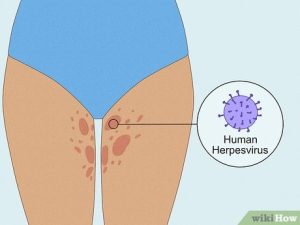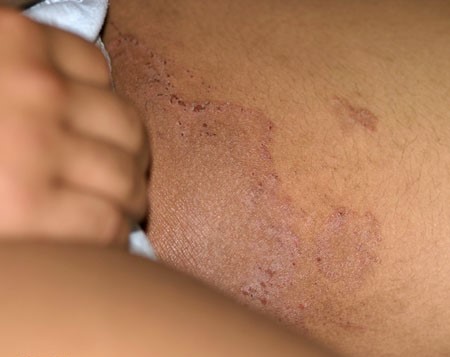Itchy rash in warm, moist areas of the body can be very uncomfortable and embarrassing. However, that itch may be a jock itch. The rash often affects the groin and inner thighs and may be shaped like a ring.
It used to be commoner in men, but experts say women are now reporting more cases, probably because of certain creams.
 Symptoms
Symptoms
According to consultant dermatologist at the Lagos State University Teaching Hospital, Ikeja, Dr. Folakemi Cole-Adeife, jock itch can start with a spreading rash that begins in the crease of the groin and moves down the upper thigh and buttocks. It may be full or partially ring-shaped, scaly, or a rash that might be red, brown, purple or gray, depending on your skin colour.
Risk factors
The conditions that can predispose you to the itchy rash are:
- Tight clothes that irritate the skin
- Moisture in your groin area from sweating
- Wearing a wet bathing suit for a long time
- Sharing damp towels or sweaty clothing with other people
- Close contact with someone who has jock itch
- Weakened immune system or diabetes
Jock itch treatment
Cole-Adeife recommends the following:
Wash your undies frequently: Your underwear should be washed after each daily use because the skin has shed on it, and it can cause infection.
Use pH-balanced cleanser: If you were using other cleansers not pH balnced, you should change to a pH-balanced cleanser. It shields the skin from environmental stressors and reduces moisture loss. It is non-irritating and non-drying, which means they won’t leave your skin feeling itchy or tight. It is also non-sensitising.
Avoid triple-action creams: Triple acrion creams may contain steroids and can prolong infections and give a false sense of solution to skin problems.
According to Dr. Cole-Adeife, triple action creams make you dependent on them because you have to continue using them for a longer period to get rid of the problem that you are trying to solve.
“As dermatologists, we advise people against the use of triple action creams, particularly because most of them have very strong steroids. Steroids are in different categories or classes. You have some that are mild, you have some that are strong and you have some that are in-between,” she said.
Use antifungal powder: Antifungal powder treats fungal or yeast infections in your skin. Dust the affected areas with the antifungal powder once or twice daily.
Wash the area and then dry using a clean towel, and use a different towel on the rest of your body.
If you do all these, and it does not go away, please, see a dermatologist.


